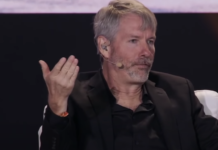
Coinbase, the largest cryptocurrency exchange in the U.S., is putting increased focus on international expansion, according to the company’s vice president for international policy Tom Duff Gordon.
“We want to bring a billion people into crypto, we’re all about economic freedom,” Gordon said during Zebu Live 2023 conference in London. “And so scaling internationally is kind of getting more and more important for us, particularly given where the U.S. is.”
Last year, Coinbase unveiled its “Go Broad, Go Deep” strategy for international markets, which recently saw the company registering as a cryptocurrency exchange and custodian wallet provider with the Bank of Spain and obtaining the Major Payment Institution (MPI) license from The Monetary Authority of Singapore (MAS).
Coinbase is now “adopting this kind of international first mentality,” said Gordon
In addition to the previously secured registrations in Ireland, Germany, and the Netherlands, Coinbase also obtained a license from the Bermuda Monetary Authority (BMA) to set up a derivatives exchange in the British island territory.
“When we look at Singapore, we see that it’s a key hub market, and MAS, which is a regulator and the central bank there, they are just extremely progressive,” said Gordon, adding that there’s a lot going on in the South East region.
Currently, Coinbase has about 10 markets outside the U.S., with the UK, according to Gordon, being “number one,” and also including the likes of Brazil, Canada, and Australia.
Coinbase tackles US regulations
When it comes to the U.S., Coinbase has a responsibility to fight for regulatory clarity, said Gordon.
“In a perfect world, we’d have a kind of common exchange process with the regulator. It’s what happened in Europe. It’s what happens in Singapore. It’s what’s happening here in the UK,” he said.
Stateside, the Securities and Exchange Commission (SEC) has slapped Coinbase with a lawsuit, accusing the crypto exchange of selling unregistered securities.
“Our strongly held belief is that tokens are not securities, they’re actually commodities,” said Gordon, adding that regulatory matters in the U.S. are getting complicated due to the “tough battle” between the SEC and the Commodity Futures Trading Commission (CFTC).
“We’re determined to try and drive that regulatory clarity. We don’t want to be in a position where we’re suing our regulator. That is not where we want to be, but we will do whatever we have to do in order to get clarity for this industry,” stated Gordon.
The Coinbase exec also praised his colleagues in Washington with whom he’s trying to get support in Congress, adding that the exchange is ready to go on whatever path is needed to achieve its goal.
“There’s also an election next year, so whether we go through the regulator, or whether we go through Congress, we are committed to staying in the U.S. doing everything we possibly can to drive this agenda,” said Gordon. “We know that we want to work with everybody because we think the U.S. is a really important market.”
While it may not come tomorrow, Gordon also said he thinks “we are on a good path” to get that.
“There’s only 300 million people in the U.S., and there’s also Brian Armstrong’s [Coinbase CEO] big vision to bring a billion people into crypto, but we can’t just do that in the U.S.,” said Gordon.








